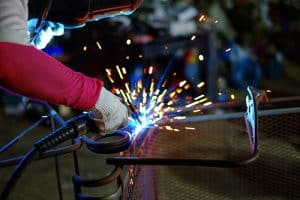
Choosing the right material is critical when working on metal fabrication and construction projects in East Texas. Aluminum and steel are two of the most commonly used metals in welding projects, but they have distinct properties that make them suitable for different applications. If you’re unsure which material is the best choice for your next project, it’s essential to understand the differences between aluminum welding vs. steel welding. In this blog, we’ll explore the pros and cons of welding with each metal, helping you make an informed decision for your project in East Texas.
The Basics: Aluminum Welding vs. Steel Welding Welding Techniques
One of the most important factors to consider when comparing aluminum welding vs. steel welding is the difference in welding techniques. Each material requires a unique approach, and understanding these differences can help you decide which is best for your project.
Thermal Conductivity
Aluminum conducts heat faster than steel, meaning the welder must take special care to prevent the material from warping or melting. This requires higher heat input and more precise control during welding. On the other hand, steel’s lower conductivity allows for more forgiving welds, making it a more approachable material for beginners.
Melting Point
Aluminum’s much lower melting point makes welding it more challenging, especially on thicker sections. Welders must ensure they don’t overheat the aluminum, which can cause structural weaknesses. Steel, with its higher melting point, is more stable during welding and less prone to damage from excess heat.
Oxidation
Aluminum develops a thin layer of oxide on its surface that can interfere with the welding process. To achieve a clean and strong weld, the oxide must be removed before welding. Steel doesn’t face this challenge to the same extent, although rust and other impurities can still affect the quality of the weld.
Applications for Aluminum Welding vs. Steel Welding
The choice between aluminum welding vs. steel welding often comes down to the specific application. Let’s take a look at some common uses for both materials and how they are applied in projects across East Texas, including Tyler TX welding jobs.
Aluminum Welding Applications
Due to its lightweight and corrosion-resistant properties, aluminum is often used in industries like aerospace, automotive, and marine construction. It’s ideal for projects that require high strength but need to keep weight to a minimum. In East Texas, aluminum is also popular for projects exposed to moisture and weather, such as outdoor structures and equipment.
Steel Welding Applications
Steel is the go-to choice for heavy-duty projects that require extreme strength and durability. From bridges and skyscrapers to pipelines and industrial equipment, steel is the preferred material in construction and manufacturing. Tyler TX welding projects frequently use steel for agricultural machinery, structural supports, and commercial building frameworks. Steel’s toughness makes it ideal for any application that demands long-term strength and resistance to wear and tear.
Pros and Cons of Aluminum Welding vs. Steel Welding
Now that you know the key differences in techniques and applications, let’s examine the pros and cons of aluminum welding vs. steel welding to help you determine which material is right for your project.
Aluminum Welding Pros
Lightweight but strong: Aluminum is about one-third the weight of steel, making it ideal for projects where weight is a concern.
Corrosion-Resistant: It’s highly resistant to rust and corrosion, even in harsh environments like marine or outdoor applications.
Aesthetic Appeal: Aluminum has a clean, modern look and is very malleable, so it can easily be shaped into all kinds of complex, beautiful designs.
Steel Welding Pros:
High Strength: Steel is incredibly strong, making it ideal for heavy-duty projects.
Easier to Weld: Steel is more forgiving during the welding process and can be welded with a variety of techniques.
Cost-Effective: Steel is generally more affordable than aluminum, especially for larger projects.
Which Material Will You Choose for Your East Texas Project?
Ultimately, the choice between aluminum welding vs. steel welding depends on your project’s specific needs. If you’re working on a lightweight structure that requires corrosion resistance, aluminum might be the best option. On the other hand, if strength and durability are your top priorities, steel could be the better choice.
At Second Generation Arc ‘N’ Spark, we offer both Tyler TX welding services for aluminum and steel projects. Whether you need aluminum welding for a custom fabrication or steel welding for a large construction project, our expert team is here to help. We provide top-quality welding solutions tailored to your unique requirements, ensuring that your project is completed with precision and professionalism. For top-tier Tyler TX welding services, contact Second Generation Arc ‘N’ Spark today to discuss your project’s needs and get started on a solution that works for you.
